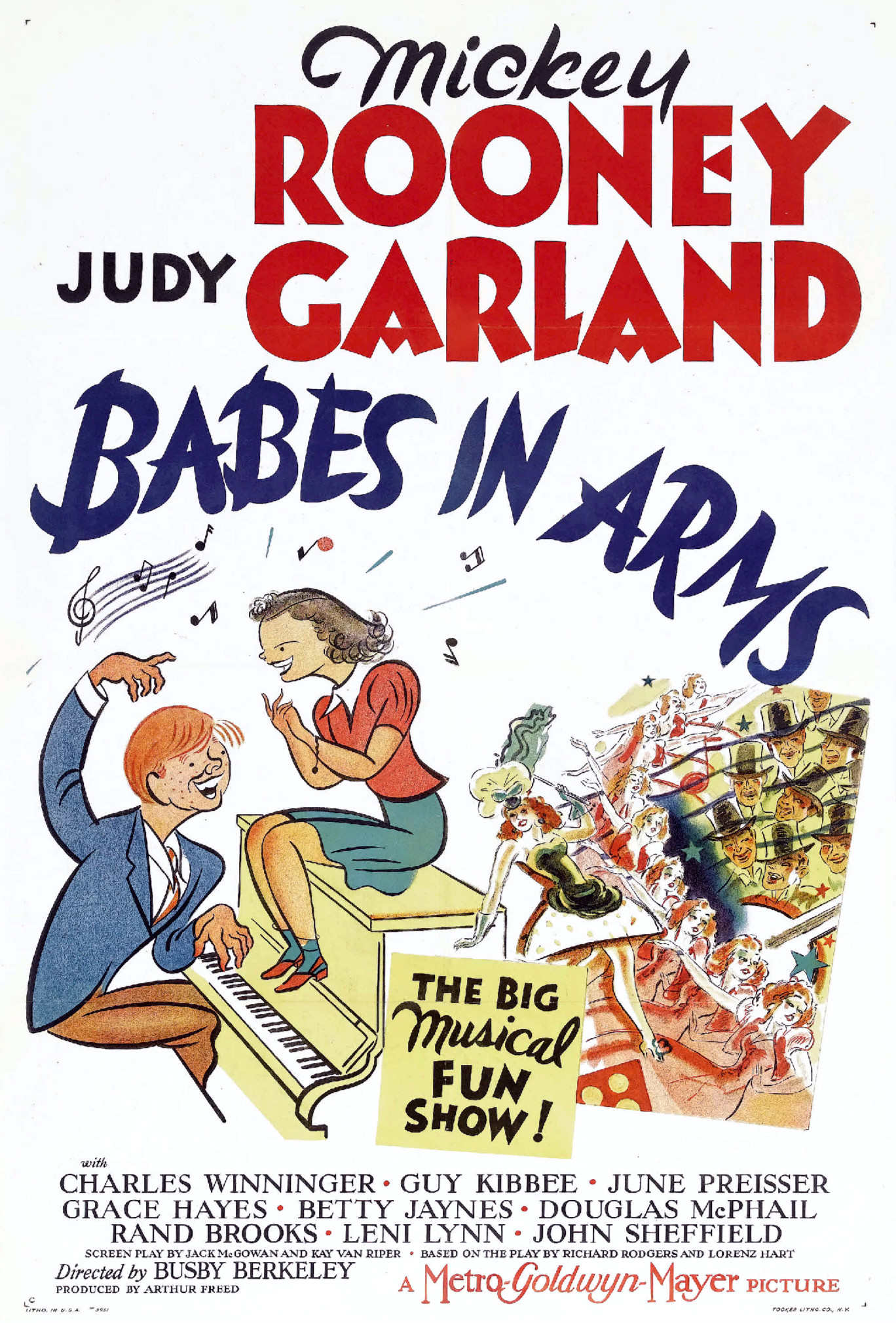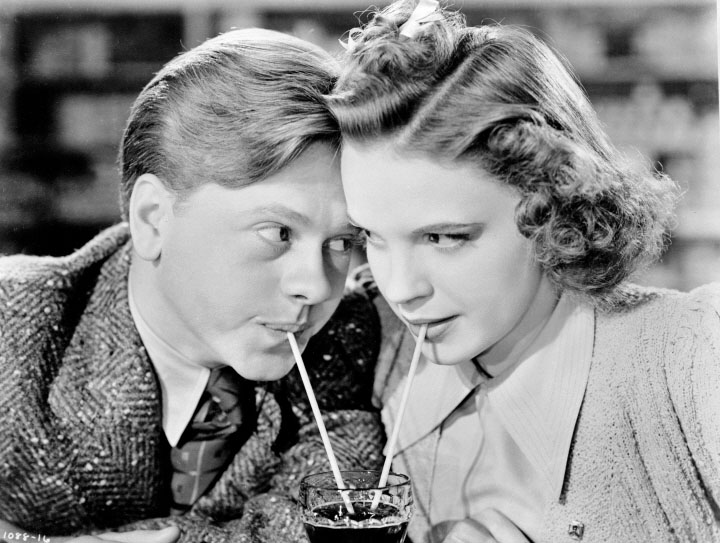Mickey @ 100: "Babes in Arms"
 Monday, September 21, 2020 at 6:00PM
Monday, September 21, 2020 at 6:00PM  by Camila Henriques
by Camila Henriques
As we continue our centennial tribute to Mickey Rooney, it’s time to talk Babes in Arms. For a long time the 1939 musical was remembered mostly because of the pairing of Rooney and real life BFF Judy Garland, but the conversation has shifted to a necessary bumpier road, since the movie is just one of many examples of that era to feature performances in blackface (including the two leads).
The film’s place in Mickey’s career is not to be diminished: he received an Oscar nom for Best Actor at the age of 19 (the second youngest ever nominated) . The year before he had been awarded a Juvenile Oscar (Judy won the same honor the following year, as she had this hit and that other 1939 film).

A vaudevillian kid just like his co-star, Rooney was already a veteran when Babes… came around, with his Andy Hardy journey already begun...
He has a captivating screen presence, and the fact that the character is also named Mickey just makes it easier for us to feel drawn to him. His talent for physical comedy in the scene he directs other actors and has to play different characters within seconds is pure genius. Mickey was a very mature actor at that age, and it didn’t hurt to have him alongside one of the greatest performers in film history, who was already so captivating at 16. It all boils down to chemistry.
There are a few pairings throughout movie history that are irresistible, and Mickey Rooney and Judy Garland certainly belong to that list. From their first appearance here, singing that “Good Mornin’” (a tune that, years later, would find a place in cinephiles hearts thanks to Gene Kelly, Debbie Reynolds and Donald O’Connor in Singing in The Rain’, a film that has a few other connections to this one) to their most dramatics moments as a couple, Mickey’s Mickey and Judy’s Patsy are just too loveable.
But, as the film progresses, it fails to keep up with the energy of the rehearsal and protesting scenes. It also features a sequence that just should not exist: a group of white actors in blackface singing “Oh, Susanna”. Among them, Mickey and Judy. It wasn’t the first time the actress did this and, while it’s important to hold everyone involved in a decision like this accountable, we all know how Judy was controlled by the studio system. But, as another 1939 film, Gone With The Wind, is in the center of discussion because of its racist undertones and the problematic tropes for black actresses it helped perpetuate, it’s a hurdle to get through a viewing of Babes in Arms without questioning this practice of not just the studio system but the vaudevillian acts that this film (and many other early musicals) pays tribute to.
In the end, Babes in Arms is one of those problematic views. It has one of cinema’s best duos bantering like they’re seasoned pros (as they were at that point), and, at the same it’s the testament of a past that Hollywood should be ashamed of. (If you’re interested in a Arthur Freed-produced film about the arrival of talkies with that ‘Good Mornin’’ song in the soundtrack, there’s always Singin’ in The Rain)
Previously: Mickey's two earliest franchises



Reader Comments (8)
Clarification. Mick received a juvenile Oscar for 1938, the year prior to Babes in Arms. Judy got hers in 1939. The AMPAS Board of Governors voted on juvenile Oscars after nominations were announced. If a child performer was believed to have done exemplary work but been overlooked, the Board of Governors May have chosen bestow the juvenile Oscar to correct the slight.
This is a pert film but of all their teamings I prefer Girl Crazy. Mickey's about the same but Judy's character Ginger was far less moony-eyed over him and much more tart and flip. She was growing up and away from him, which really showed in their next (and last) pairing in Words and Music.
He gives a terrible manic performance as Lorenz Hart and their duet together where she appears as herself shows how much has changed. She's relaxed and breezy-a mature performer (though it's odd that since the two numbers that she performs are supposed to be done at the same party the styling of her dress changes and her weight fluctuates.) while he hops around her like he's still that teenage kid.
I think he appeared to better advantage after this period when he moved into character work such as Requiem for a Heavyweight and The Comic.
Thanks for the clarification, James!
I saw this movie at a revival house in Detroit when I was a kid and loved it. Though I never saw it again. While I normally don't 'get' Mickey Rooney's appeal this is my favorite of his manic energy musical performances. and Judy is divine as always.
weirdly I don't remember the blackface sequence at all. If I did notice it at the time iI must have chalked it up to "oh, vaudeville" as old movies regularly paid obvious tribute to vaudeville tropes.
The number I remember most clearly is "Where or When" since you get to hear it in two stylings (operatic then Judy)
About the blackface number, I'm sure that Mickey & Judy could have refused it if they really pooled their clout and protested, but who knows what they're doing when they're teenagers? But mostly, Babes In Arms is closer in time to the Civil War than it is to today, so I can't hold people to today's standards. Phew, enough of that.
Mickey & Judy together are terrific though I mix this up with Babes on Broadway all the time, and like Joel6, I prefer Girl Crazy anyway since that's more about Judy than Mickey. ;-)
Which of these 5 performances does not belong?
Robert Donat - Goodbye, Mr Chips
Clark Gable - Gone with the Wind
Laurence Olivier - Wuthering Heights
Mickey Rooney - Babes in Arms
James Stewart - Mr Smith Goes to Washington
(So sorry about Henry Fonda - Young Mr Lincoln and Michael Redgrave - The Lady Vanishes who were right there and eligible)
I saw this years ago. I mostly remember Judy outshining Mickey, whose temper tantrums were almost comical in how over the top they were.
I also recall giggling at how Mickey's character wanted to produce a modern show, and then proceeded to put on such an old-fashioned musical. I guess everything was modern once upon a time!
MGM really knew how to showcase their young stars and yes that black face number is now cringe worthy